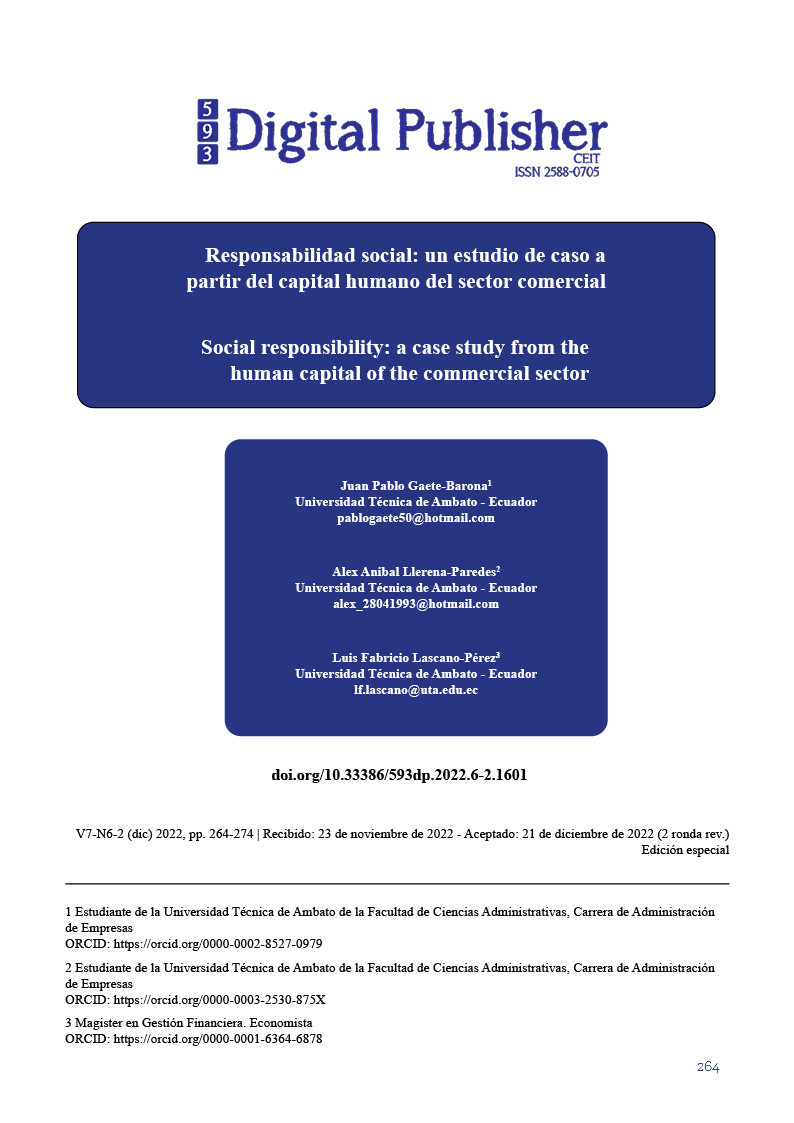Social responsibility: a case study from the human capital of the commercial sector
Main Article Content
Abstract
Social responsibility and human capital aims to raise awareness and importance of socially responsible behavior by reducing the negative impacts on society or the environment. Therefore, the objective of the study is to analyze the variables that have the greatest influence at the level of CSR and human development. The methodological design was qualitative-quantitative, qualitative, when analyzing the six (6) dimensions presented by the ISO 26000 model as a reference and quantitative framework, since it was an instrument validated by experts. The study sample was of three hundred and eighty-four (384) workers. The scope of the research was correlational, since it established the hypothetical criteria according to each dimension (human rights, labor practices, environment, fair practices, self-improvement and active participation). It is concluded that the dimensions that positively influence the perception of human capital on the level of social responsibility are based on: offering quality of work to employees, having strategies for caring for the environment, keeping in mind the opinion of the consumer and the active participation with the community.
Downloads
Article Details

This work is licensed under a Creative Commons Attribution-NonCommercial-ShareAlike 4.0 International License.
1. Derechos de autor
Las obras que se publican en 593 Digital Publisher CEIT están sujetas a los siguientes términos:
1.1. 593 Digital Publisher CEIT, conserva los derechos patrimoniales (copyright) de las obras publicadas, favorece y permite la reutilización de las mismas bajo la licencia Licencia Creative Commons 4.0 de Reconocimiento-NoComercial-CompartirIgual 4.0, por lo cual se pueden copiar, usar, difundir, transmitir y exponer públicamente, siempre que:
1.1.a. Se cite la autoría y fuente original de su publicación (revista, editorial, URL).
1.1.b. No se usen para fines comerciales u onerosos.
1.1.c. Se mencione la existencia y especificaciones de esta licencia de uso.
References
Arena, M., Azzone, G., & Mapelli, F. (2018). What drives the evolution of Corporate Social Responsibility strategies? An institutional logics perspective. Journal of Cleaner Production, 171, 345–355. https://doi.org/10.1016/j.jclepro.2017.09.245
Buitrago, K., & Pabón, J. (2021). Revisión de literatura sobre los recursos humanos y la responsabilidad social empresarial. Revista de Ingenierías Interfaces, 4(1), 1–11.
García Solarte, M., & Duque Ceballos, J. L. (2015). Gestión humana y responsabilidad social empresarial: un enfoque estratégico para la vinculación de prácticas responsables a las organizaciones. Libre Empresa, 9(1), 13–37. https://doi.org/10.18041/1657-2815/libreempresa.2012v9n1.2965
Hernández-Sampieri, R., Fernández-Collado, C., & Lucio, P. B. (2014). Metodología de la Investigación. In M. Toledo (Ed.), Animal Genetics (Sexta). McGraw Hill.
Hurtado Morales, J. A. (2012). La representación social de reciclaje y cuidado del entorno, una propuesta de aula para la educación media.
López, A., Ojeda, J. F., & Ríos, M. (2017). The corporate social responsibility from the perception of human capital. A case study. Revista de Contabilidad-Spanish Accounting Review, 20(1), 36–46. https://doi.org/10.1016/j.rcsar.2016.01.001
Palacio, A., Mantilla, D., & Arias, H. (2017). Responsabilidad Social en Ecuador: estudio de caso Adelca y Unilever. Área Del Conocimiento: Administración de Empresas; Responsabilidad Social Empresarial, 148(1), 148–162.
Pedraza, N. (2020). Satisfacción laboral y compromiso organizacional del capital humano en el desempeño en instituciones de educación superior. RIDE Revista Iberoamericana Para La Investigación y El Desarrollo Educativo, 10(20). https://doi.org/10.23913/ride.v10i20.595
Pintado, M. (2021). Responsabilidad social gubernamental para empoderamiento femenino en la región Lambayeque. PINTADO, M.D.P., 8(1), 2013–2015.
Rea, A. R., & Paspuel, V. J. (2017). Modelo de gestión empresarial para la conversión de empresas tradicionales a ecoempresas en el Ecuador. Revista Publicando, 11, 23.
Román, D. (2017). Departamento de ciencias económicas administrativas y de comercio. Contaduria y Administracion, 62(1), 105–122.




